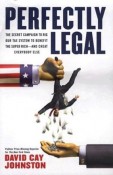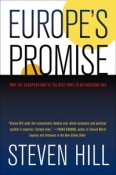Q&A: DAVID CAY JOHNSTON Pulitzer Prize Winning Journalist, Author
Written on April 5th, 2011 |
Aired 04/03/11
Today one of our two major political parties - nationally and in state capitols -- is unwilling to consider raising taxes no matter what the circumstances. Though most of Washington's officials and media are hysterical about the deficit, and willing to hurt anyone in an effort to reduce it, both parties voted in December to extend tax breaks for the wealthiest Americans for two more years.
I last interviewed today's guest, Pulitzer Prize winning tax writer, DAVID CAY JOHNSTON in January 2009 on the day of Barack Obama's inauguration, We talked then about how we could make the most of the opportunity presented by the financial catastrophe. Did the bailouts make sense? and What could we do that would be smarter, more efficient, more effective - that might work?
DAVID CAY JOHNSTON worked as an investigative reporter for several newspapers. He was with the Los Angeles Times from 1976 to 1988, and at the New York Times from 1995-2008 where he won a Pulitzer Prize for his innovative coverage of our tax system He now teaches the tax, property and regulatory law of the ancient world at Syracuse University College of Law and Whitman School of Management and writes a column at tax.com. He is the author of two bestsellers, Perfectly Legal and Free Lunch. His next book, The Fine Print, will be published in 2011.
Q&A: STEVEN HILL, Author – Europe’s Promise
Written on June 2nd, 2010 |
Aired 05/30/10
We're hearing a lot about the trouble Europe is in. The debt crisis in Greece, and perhaps Spain, Portugal, and Italy, is threatening the Euro and the European Union. What's really going on? How did it happen? How bad is it? How will they deal with it? And what does it mean for the rest of the world and for the US in particular?
We'll deal with those issues this Sunday, but that's not all. While the bad news of this Euro crisis makes headlines in the US, a quiet and successful revolution taking place in Europe does not. Europe seems to be finding a way to make capitalism and democracy work for people, not just for corporations. I think this is a critical unreported story in terms of its potential impact. Here's just a few things you may not have heard about.
The European Union, 27 member nations with a half billion people, has become the largest, wealthiest trading bloc in the world, producing nearly a third of the world's economy - nearly as large as the U.S. and China combined. Europe has more Fortune 500 companies than either the US, China or Japan.
European nations are rated by the World Health Organization as having the best health care systems in the world. Yet they spend far less than the United States for universal coverage, even as U.S. health care is ranked 37th.
Europe leads in confronting global climate change with renewable energy technologies like solar and wind power, conservation and "green design," creating hundreds of thousands of new jobs in the process. Consequently, Europe's ecological "footprint" (the amount of the earth's capacity that a population consumes) is about half that of the United States for the same standard of living.
